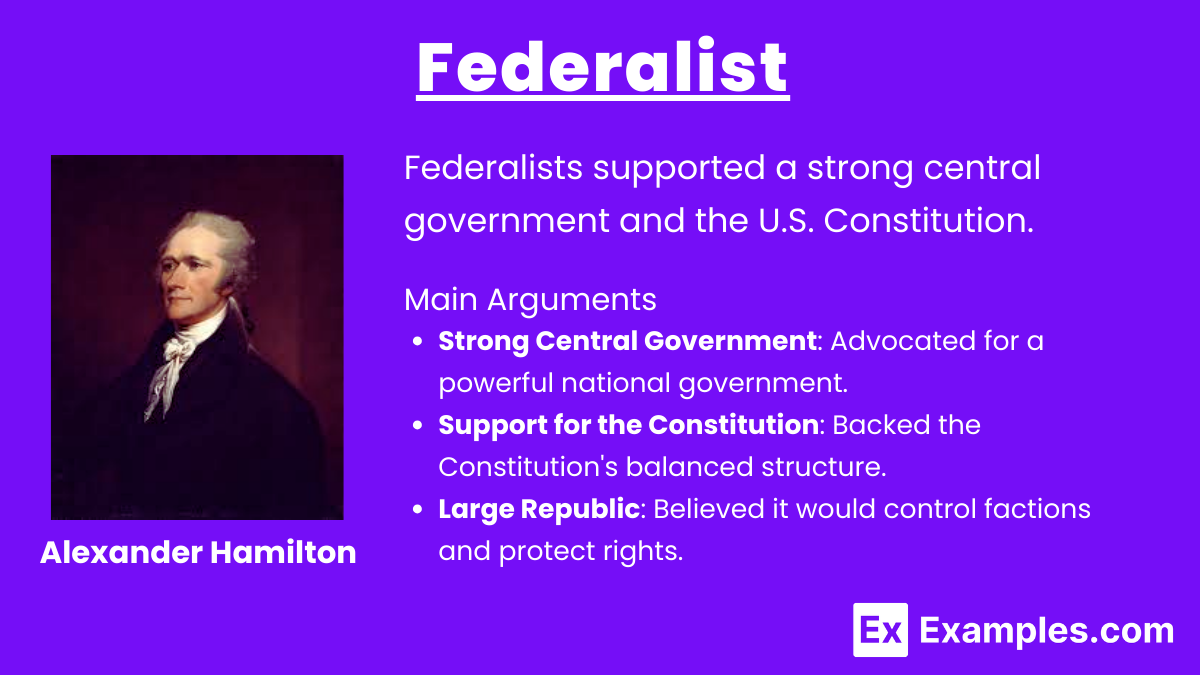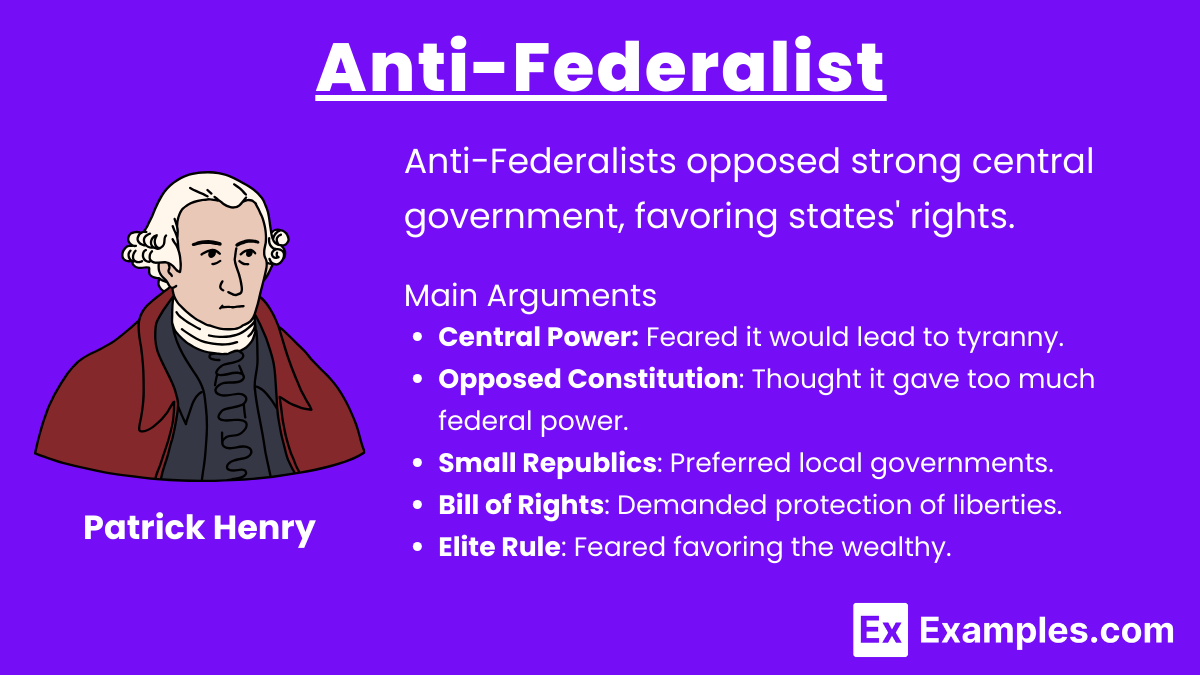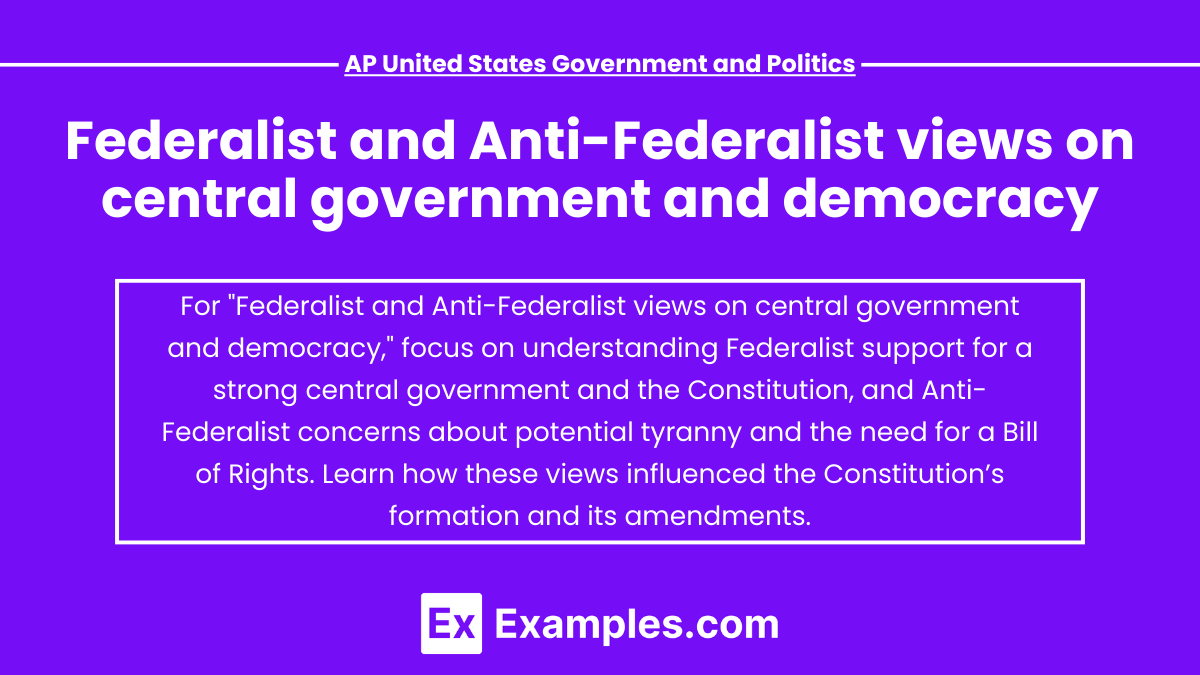The debate between Federalists and Anti-Federalists was central to the formation of the United States Constitution, shaping the nation’s approach to central government and democracy. Federalists advocated for a strong central government to ensure national stability and effective governance, while Anti-Federalists feared that such centralization would threaten individual liberties and state autonomy. This clash of ideas influenced the drafting of the Constitution and the inclusion of the Bill of Rights, reflecting differing visions of federal power and democratic governance.
Free AP United States Government and Politics Practice Test
Learning Objectives
For "Federalist and Anti-Federalist views on central government and democracy" in AP United States Government and Politics, you should understand the key differences between Federalist and Anti-Federalist arguments. Learn how Federalists supported a strong central government and the Constitution for national stability and unity, while Anti-Federalists advocated for state sovereignty and the protection of individual rights through a Bill of Rights. Analyze how these differing perspectives shaped the Constitution’s formation and the eventual inclusion of the Bill of Rights to address Anti-Federalist concerns.
Federalist Views

Key Figures: Alexander Hamilton, James Madison, John Jay
Main Arguments:
Strong Central Government:
Federalists advocated for a strong central government to ensure stability and unity among the states. They believed that a powerful national government was necessary to address issues that the states alone could not, such as defense, economic regulation, and foreign policy.Support for the Constitution:
Federalists supported the new Constitution, arguing that it provided a balanced government structure with separate branches (Legislative, Executive, Judicial) to prevent tyranny and protect individual liberties. They emphasized that the system of checks and balances would prevent any one branch from becoming too dominant.Advantages of a Large Republic:
Federalists, especially in The Federalist Papers, argued that a large republic would better control factions and prevent any single group from dominating. They believed that a diverse and extended republic would dilute the influence of any one faction, protecting minority rights and ensuring a more stable government.Economic Stability:
Federalists argued that a strong central government could better manage economic issues, such as national debt and interstate commerce. They believed that a unified economic policy would promote economic growth and stability, which was difficult to achieve under the Articles of Confederation.Protection of Individual Rights:
Although initially opposed to a Bill of Rights, Federalists argued that the Constitution itself provided sufficient protection for individual rights through its structure and limitations on government power. They believed that specific amendments were unnecessary.
Anti-Federalist Views

Key Figures: Patrick Henry, George Mason, Thomas Jefferson
Main Arguments:
Fear of Centralized Power:
Anti-Federalists were concerned that a strong central government would erode states' rights and individual liberties. They feared that the new Constitution gave too much power to the national government, potentially leading to tyranny and a loss of local control.Opposition to the Constitution:
Anti-Federalists opposed the Constitution, arguing that it created a federal government that was too powerful and lacked sufficient safeguards for individual freedoms. They believed that the proposed system would centralize too much authority and undermine the autonomy of state governments.Emphasis on Small Republics:
Anti-Federalists preferred smaller republics where citizens could be more directly involved in governance. They argued that smaller, more localized governments would be more responsive to the needs of their citizens and better protect individual rights.Demand for a Bill of Rights:
Anti-Federalists strongly advocated for a Bill of Rights to explicitly safeguard individual liberties against potential government overreach. They believed that without these amendments, citizens' rights would not be adequately protected under the new Constitution.Distrust of Elite Rule:
Anti-Federalists were wary of an elite class dominating the new government. They feared that the Constitution’s structure would favor the wealthy and well-connected, sidelining ordinary citizens and reducing democratic participation.
Examples
Example 1 : Federalist Support for a Strong Central Government
Federalists, such as Alexander Hamilton and James Madison, argued that a strong central government was essential for maintaining national unity and addressing issues that the states could not handle individually. They believed that a robust federal system would provide stability, manage defense, and regulate interstate commerce effectively, which was not possible under the weaker Articles of Confederation.
Example 2 : Anti-Federalist Concern Over Centralized Power
Anti-Federalists, including Patrick Henry and George Mason, were worried that a powerful central government would undermine state sovereignty and individual liberties. They feared that the new Constitution would create a federal government that could become tyrannical and erode the autonomy of the states, thus threatening the freedoms and rights of citizens.
Example 3: Federalist Argument for a Large Republic
Federalists, particularly in The Federalist Papers, argued that a large republic would be more effective in controlling factions and protecting minority rights. They believed that a diverse and extensive republic would prevent any single group from dominating and ensure a more stable and balanced government, which they thought was less feasible in smaller, more homogeneous states.
Example 4 : Anti-Federalist Advocacy for a Bill of Rights
Anti-Federalists demanded the inclusion of a Bill of Rights in the Constitution to explicitly safeguard individual freedoms and protect against potential government overreach. They argued that the original Constitution lacked sufficient protections for civil liberties, and they wanted clear amendments to guarantee rights such as freedom of speech, religion, and the press.
Example 5 : Federalist View on Economic Stability
Federalists believed that a strong central government could effectively manage national economic issues, such as the national debt and interstate trade. They argued that a unified economic policy under a central authority would promote stability and growth, which was challenging under the decentralized economic framework of the Articles of Confederation.
Multiple Choice Questions
Question 1
Which of the following was a primary concern of the Anti-Federalists regarding the proposed Constitution?
A) Lack of a Bill of Rights
B) Too much power granted to the states
C) Inefficient management of foreign affairs
D) Excessive power given to the President
Answer: A) Lack of a Bill of Rights
Explanation: Anti-Federalists were concerned that the original Constitution did not include a Bill of Rights to protect individual liberties. They feared that without explicit guarantees of freedoms such as speech, religion, and the press, the new federal government could become oppressive. This concern led to the adoption of the Bill of Rights.
Question 2
What was a key argument made by Federalists in favor of a large republic?
A) Smaller republics were too efficient in managing factions
B) A large republic would dilute the influence of factions and prevent dominance by any single group
C) Smaller republics could better protect individual rights
D) A large republic would be less effective in managing economic policies
Answer: B) A large republic would dilute the influence of factions and prevent dominance by any single group
Explanation: Federalists argued that a large republic would be more effective in controlling factions and preventing any single group from dominating the government. They believed that a larger, more diverse republic would make it harder for any one faction to gain excessive power.
Question 3
How did Federalists respond to Anti-Federalist fears of a strong central government?
A) By agreeing to add a Bill of Rights to the Constitution
B) By proposing the creation of additional state governments
C) By arguing that the Constitution’s checks and balances would prevent any one branch from becoming too powerful
D) By limiting the power of the President to act independently
Answer: C) By arguing that the Constitution’s checks and balances would prevent any one branch from becoming too powerful
Explanation: Federalists emphasized the Constitution’s system of checks and balances to address Anti-Federalist concerns about centralized power. They argued that the separation of powers among branches would prevent any single branch from dominating and ensure that power was appropriately balanced and limited.


